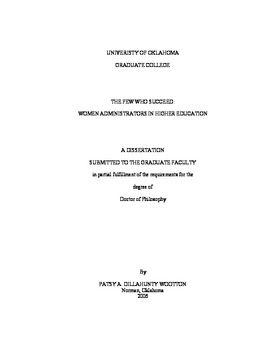| dc.contributor.advisor | Fox, Robert, | en_US |
| dc.contributor.author | Wootton, Patsy A. Dillahunty. | en_US |
| dc.date.accessioned | 2013-08-16T12:20:19Z | |
| dc.date.available | 2013-08-16T12:20:19Z | |
| dc.date.issued | 2006 | en_US |
| dc.identifier.uri | https://hdl.handle.net/11244/1064 | |
| dc.description.abstract | Vignettes of the interview participants provide detailed description of each individual participant; survey data provide generalized descriptions. The various themes that emerged from the interviews and survey data were leadership perspective, leadership performance, motivation factors, and barriers. The process of women's development and revelations of the data indicate that women excel as higher education administrators based on their internal motivation factors and dedication to their institution. The survey participants and interview participants provided valuable insight concerning female leadership, but women must pursue opportunities presented and find their own personal balance between family and career in order to enjoy career advancement. | en_US |
| dc.description.abstract | Women in senior administrative positions in colleges and universities are essential to women's development, an important goal in higher education institutions, because they provide role models to female students, faculty, and staff. The current percentage of women serving in presidential positions (21 percent nationally and 6 percent in Oklahoma) is low; studying the successful women will help open the doors for other women who are willing to accept the challenge of higher education leadership. This study explores women's development theory, leadership theories, and self-determination theory to explain successful female leadership. Current literature concerning female leadership indicates that the factors leading to women attaining senior administrative positions in colleges and universities are issues such as willingness to accept challenges, career opportunities, self-determination, recognition of leadership abilities by peers and self, and the internal motivation to have a positive impact on society. | en_US |
| dc.description.abstract | This phenomenological study uses in-depth interviews with six women serving as senior administrators at higher education institutions to capture the essence of successful female leadership. A survey of the entire population of 39 presidents, provosts, and vice presidents of Oklahoma public institutions resulted in an 85 percent return rate, and gathered information concerning demographics, career tracks, career development, perspectives, leadership styles, and motivations. | en_US |
| dc.format.extent | viii, 198 leaves ; | en_US |
| dc.subject | Women's Studies. | en_US |
| dc.subject | Education, Administration. | en_US |
| dc.subject | Education, Higher. | en_US |
| dc.subject | Women college administrators Oklahoma. | en_US |
| dc.title | The few who succeed: Women administrators in higher education. | en_US |
| dc.type | Thesis | en_US |
| dc.thesis.degree | Ph.D. | en_US |
| dc.thesis.degreeDiscipline | Department of Educational Leadership and Policy Studies | en_US |
| dc.note | Source: Dissertation Abstracts International, Volume: 67-05, Section: A, page: 1615. | en_US |
| dc.note | Adviser: Robert Fox. | en_US |
| ou.identifier | (UMI)AAI3220367 | en_US |
| ou.group | Jeannine Rainbolt College of Education::Department of Educational Leadership and Policy Studies | |
